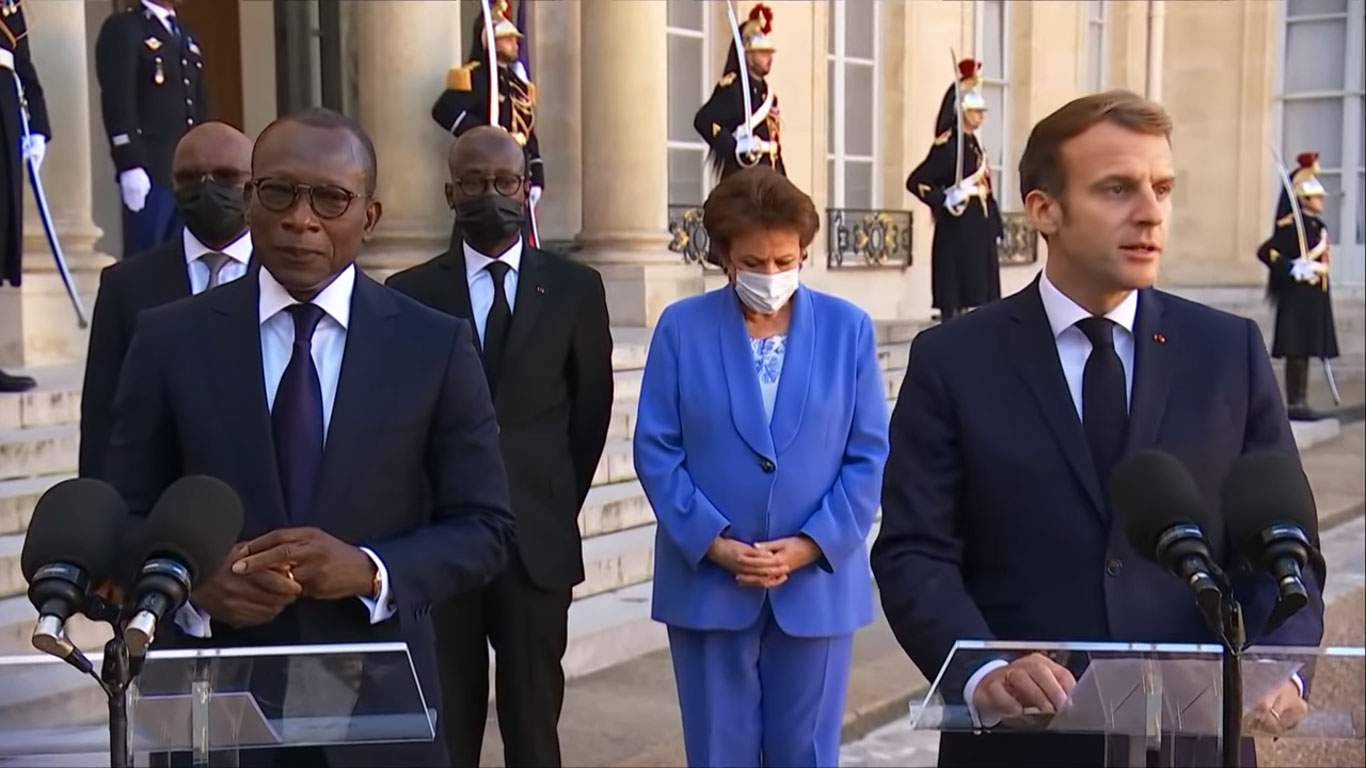They had been on display at the Musée du Quai Branly in Paris for a week, October 26-31: now, the 26 objects from the royal treasures of the Danhomé kingdom and taken by the French during the Benin colonization war of 1890-1894(we had told their story on these pages) have been officially returned by France to Benin. On Tuesday, President of the Republic Emmanuel Macron received the President of the Republic of Benin, Patrice Talon, at the Elysée Palace to sign the deed of transfer of ownership and to finalize the process of returning the 26 objects to the African republic. Also included in the list are valuable and rare works of art, including three valuable bochio statues (large sculpture-amulets depicting Beninese kings transfigured into animals) and six asẽn portable altars, as well as a royal scepter, scepters, ceremonial chairs, garments, and even the wooden doors of King Glèlè’s palace.
Macron’s commitment to return the objects goes back four years: it was in fact Nov. 28, 2017, when the French president, during a visit he made to Ki-Zerbo University in Ouagadougou, Burkina Faso, pledged to make possible, within five, the conditions for the temporary or permanent return of African heritage to France. The commitment resulted in the celebrated report by Felwine Sarr and Bénédicte Savoy, who, on official assignment from the president, presented a lengthy report on November 23, 2018, on the basis of which Macron decided to return the works claimed by the authorities of Benin, which were part of the collection of the Musée du Quai Branly-Jacques Chirac, as well as, for now, the saber of El Hadj Omar Tall, requested by the Republic of Senegal. To make the returns possible, the French Parliament passed a law on Dec. 24, 2020, allowing for an exception to the principle of inalienability of objects that are part of state collections. Underlying this commitment is the idea that Africans, and in particular young people, should have access in Africa, and therefore no longer just in Europe, to their heritage.
“I am very pleased,” Macron said in the official speech, “because this is a moment that is not only symbolic but moving, I must say, and historic. Indeed, we have just signed together with the President of the Republic of Benin, Patrice Talon, a long-awaited and long-desired historic act: the signing by the Ministers of Culture of our two countries of a transfer of ownership agreement that constitutes the last stage in the process of returning the 26 works of the Abomey treasures. This restitution, which is becoming a tangible reality, is the result of a long work. There has been considerable work in Benin and France to accompany this restitution, exemplary cooperation in cultural, scientific matters that we had the opportunity to detail during the October 27 ceremony at the Quai Branly - Jacques Chirac Museum, through ambitious programs in terms of training and support for Beninese cultural and heritage projects, and in particular for the future Musée d’Abomey, supported by the Agence française de développement, through this unprecedented collaboration that has been established between our two countries around this restitution. In my opinion, therein lies the whole significance of this gesture.”
“Beyond this restitution,” Macron added, “we will continue the work begun since 2017, which is why I have entrusted Jean-Luc Martinez, ambassador for international cooperation in the field of heritage, with a reflection on the criteria for restitution with a view to the possible drafting of a framework law. The works are now ready to leave, after their exhibition during the Beninese Cultural Week dedicated to them at the Quai Branly - Jacques Chirac Museum, which was a huge success with the public, and were packed by Beninese and French curators in crates. Now they are at the airport, ready to leave for their country, for the people of Benin. And a new page opens for these works, but also for the partnership between Benin and France. A partnership from state to state, from professionals to professionals, from civil society to civil society, from youth to youth, a partnership of equals. Today I am pleased with this step that we are taking together out of a common will, because you had the courage to ask for what was owed to you, because many had the courage to illuminate this path, and because curators, scientists, and artists had the courage to go back on what had been taboo until then. Today’s gesture is a chance for young Beninese and young Africans to find works of their own history and heritage, to be able to admire them at home. And I hope that this movement will continue and that the universal will be as accessible in Cotonou as in Paris.”
The return of the works to Benin and Macron’s speech set an important precedent: according to the newspaper Le Monde, to date 85-90 percent of African cultural heritage remains outside the continent, and of the 90,000 African objects held in the collections of French institutions, 46,000 came from the colonial era. And the precedent may soon lead to new returns.
Pictured: Beninese President Talon and French President Macron during the ceremony to return the works.
 |
| France officially returns 26 items to Benin, including valuable works of art |
Warning: the translation into English of the original Italian article was created using automatic tools. We undertake to review all articles, but we do not guarantee the total absence of inaccuracies in the translation due to the program. You can find the original by clicking on the ITA button. If you find any mistake,please contact us.